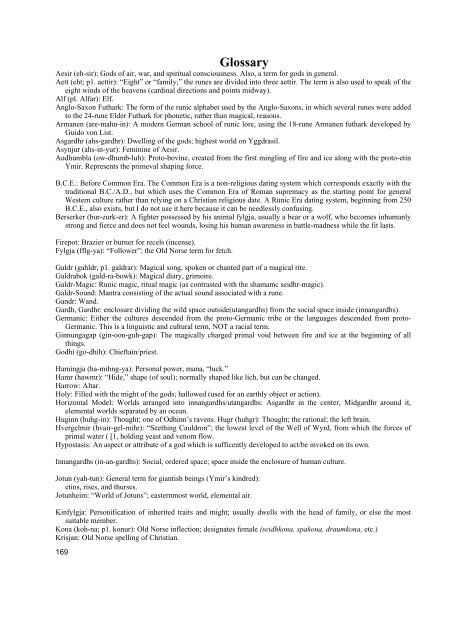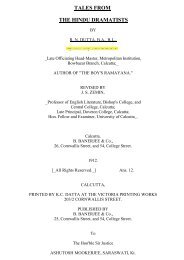TEUTONIC MAGIC - Awaken Video
TEUTONIC MAGIC - Awaken Video
TEUTONIC MAGIC - Awaken Video
You also want an ePaper? Increase the reach of your titles
YUMPU automatically turns print PDFs into web optimized ePapers that Google loves.
Glossary<br />
Aesir (eh-sir): Gods of air, war, and spiritual consciousness. Also, a term for gods in general.<br />
Aett (eht; p1. aettir): “Eight” or “family;” the runes are divided into three aettir. The term is also used to speak of the<br />
eight winds of the heavens (cardinal directions and points midway).<br />
Alf (pl. Alfar): Elf.<br />
Anglo-Saxon Futhark: The form of the runic alphabet used by the Anglo-Saxons, in which several runes were added<br />
to the 24-rune Elder Futhark for phonetic, rather than magical, reasons.<br />
Armanen (are-mahn-in): A modern German school of runic lore, using the 18-rune Armanen futhark developed by<br />
Guido von List.<br />
Asgardhr (ahs-gardhr): Dwelling of the gods; highest world on Yggdrasil.<br />
Asynjur (ahs-in-yur): Feminine of Aesir.<br />
Audhumbla (ow-dhumb-luh): Proto-bovine, created from the first mingling of fire and ice along with the proto-etin<br />
Ymir. Represents the primeval shaping force.<br />
B.C.E.: Before Common Era. The Common Era is a non-religious dating system which corresponds exactly with the<br />
traditional B.C./A.D., but which uses the Common Era of Roman supremacy as the starting point for general<br />
Western culture rather than relying on a Christian religious date. A Runic Era dating system, beginning from 250<br />
B.C.E., also exists, but I do not use it here because it can be needlessly confusing.<br />
Berserker (bur-zurk-er): A fighter possessed by his animal fylgja, usually a bear or a wolf, who becomes inhumanly<br />
strong and fierce and does not feel wounds, losing his human awareness in battle-madness while the fit lasts.<br />
Firepot: Brazier or burner for recels (incense).<br />
Fylgja (fflg-ya): “Follower”; the Old Norse term for fetch.<br />
Galdr (gahldr, p1. galdrar): Magical song, spoken or chanted part of a magical rite.<br />
Galdrabok (gald-ra-bowk): Magical diary, grimoire.<br />
Galdr-Magic: Runic magic, ritual magic (as contrasted with the shamamc seidhr-magic).<br />
Galdr-Sound: Mantra consisting of the actual sound associated with a rune.<br />
Gandr: Wand.<br />
Gardh, Gardhr: enclosure dividing the wild space outside(utangardhs) from the social space inside (innangardhs).<br />
Germanic: Either the cultures descended from the proto-Germanic tribe or the languages descended from proto-<br />
Germanic. This is a linguistic and cultural term, NOT a racial term.<br />
Ginnungagap (gin-oon-guh-gap): The magically charged primal void between fire and ice at the beginning of all<br />
things.<br />
Godhi (go-dhih): Chieftain/priest.<br />
Hamingja (ha-mihng-ya): Personal power, mana, “luck.”<br />
Hamr (hawmr): “Hide,” shape (of soul); normally shaped like lich, but can be changed.<br />
Harrow: Altar.<br />
Holy: Filled with the might of the gods; hallowed (used for an earthly object or action).<br />
Horizontal Model: Worlds arranged into innangardhs/utangardhs: Asgardhr in the center, Midgardhr around it,<br />
elemental worlds separated by an ocean.<br />
Huginn (huhg-in): Thought; one of Odhinn’s ravens. Hugr (huhgr): Thought; the rational; the left brain.<br />
Hvergelmir (hvair-gel-mihr): “Seething Cauldron”; the lowest level of the Well of Wyrd, from which the forces of<br />
primal water ( [1, holding yeast and venom flow.<br />
Hypostasis: An aspect or attribute of a god which is sufficently developed to act/be invoked on its own.<br />
Innangardhs (in-an-gardhs): Social, ordered space; space inside the enclosure of human culture.<br />
Jotun (yah-tun): General term for giantish beings (Ymir’s kindred):<br />
etins, rises, and thurses.<br />
Jotunheim: “World of Jotuns”; easternmost world, elemental air.<br />
Kinfylgja: Personification of inherited traits and might; usually dwells with the head of family, or else the most<br />
suitable member.<br />
Kona (koh-na; p1. konur): Old Norse inflection; designates female (seidhkona, spakona, draumkona, etc.)<br />
Krisjan: Old Norse spelling of Christian.<br />
169
















